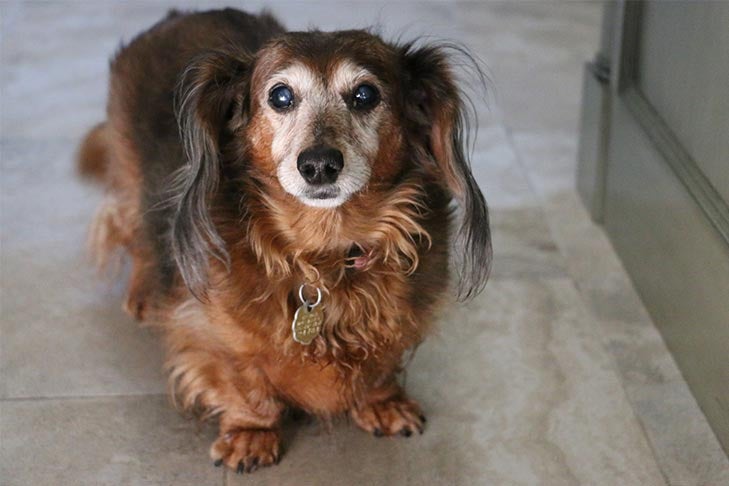- Overweight and obese dogs can have serious health problems.
- A structured feeding plan contributes to maintaining a healthy weight.
- Daily exercise is important for all dogs – even senior dogs.
Like the humans who care for them, dogs are not exempt from the battle of the bulge; they, too, struggle with weight gain and the health problems that come along with carrying around extra pounds.
“Dogs of all ages can be obese, although the greatest prevalence of obesity occurs in dogs between 5 and12 years old. This condition may result in serious health problems, decrease longevity, and detract from quality of life,” says Dr. Jerry Klein, AKC chief veterinary officer. “Obesity in dogs is a widespread problem in the U.S. today, yet it is one of the most preventable problems.”
Is My Dog Overweight?
The most recent statistics from the Association for Pet Obesity Prevention estimated that 55.8 percent of U.S. dogs were classified as overweight or obese. While the terms are sometimes used interchangeably, there is a definitive difference between being overweight and obese.
Obesity is a medical condition, a nutritional disease caused by an excess of body fat. Dogs are considered to be overweight when they are 15 percent above their ideal weight, and obese if they are 30 percent above the ideal weight, according to Dr. Leilani Alvarez, director of Integrative and Rehabilitative Medicine at the Animal Medical Center in New York City.
Veterinarians determine whether a dog is an ideal body weight and size by considering his body condition, or overall physique. “When viewed from above there should be a distinct waistline behind the ribs,” notes Dr. Alvarez. “When they’re viewed from the side, the ribs should be slightly visible, with the abdomen tucked in, no hanging belly.”
Similar to the Body Mass Index charts used to determine where a human falls on the scale, veterinarians use a grading system known as a Body Condition Score (BCS). On a grading scale from 1-to-9, an ideal body weight for dogs falls in the 5 or 6/9 range. Dogs with a BCS of 7/9 or higher become more prone to a variety of medical conditions associated with obesity.
Your vet can advise you about the number of calories and nutrients your dog needs, taking into consideration the age and breed of your dog, lifestyle, and activity level. Whether your dog needs to maintain a good weight or lose weight, the secret to success is to find a healthy diet and exercise routine that is safe and easy to continue.

The Effects of Added Weight
According to Dr. Klein, risks such as osteoarthritis, high blood pressure, skin infections, respiratory disorders, renal dysfunction, diabetes, and heart disease are some of the medical conditions more common to obese dogs.
For senior dogs, the concern is even greater due to other factors, such as a decrease in activity level that comes along with aging. Because it’s harder for older dogs to lose weight, it’s important to keep them fit in their younger years.
While no dog is exempt from the possibility of becoming overweight, there are some breeds that are more prone than others. “Obesity is more common in Basset Hounds, Beagles, Labrador Retrievers, Dachshunds, Cocker Spaniels, and several of the small terriers (such as Cairn, West Highland White, and Scottish Terriers) among others,” says Dr. Alvarez.
An article published in the Journal of Veterinary Internal Medicine reported on a study of more than 50,000 dogs consisting of 12 breeds. Researchers found that an overweight body condition was associated with a shorter life span in all breeds studied, but the magnitude of the effect varied — being least for large‐breed dogs at 5 months shorter lifespan and greatest for dogs of the smallest breed at greater than 2 years shorter lifespan.
Creating Your Dog’s Diet Plan
Weight isn’t something dogs can control; they’ll most likely keep eating whatever amount of food is in front of them. That’s why it’s best to follow a structured feeding plan when your pet is young and into the adult and senior years.
Although opinions may vary about how many times a day a dog should be fed, Dr. Alvarez says twice a day is best, as more than one meal helps to maintain a more normal metabolism. “How much they should be fed is dependent on their size and level of activity,” she says.
Deciding what type of food to feed your dog can be a source of confusion for owners; it’s all about finding what combination works best for his needs. ”Ask your veterinarian, who knows your dog and has experience with different foods, to make recommendations,” says Dr. Klein. Your vet can help you consider calorie requirements, healthy ingredients, and portion size.
“Most veterinary nutritionists recommend a consistent diet in order to ensure a balanced meal,” says Dr. Alvarez. “The most important nutrient for senior dogs is high-quality protein, due to a higher need for protein levels.” It’s also important to have consistency from everyone in the household. If the kids are sneaking snacks to your dog from the table, they’re not really doing him any favors.
Treats are an important part of the weight management equation. They should never exceed more than 10 percent of total daily calories. Owners can use dog treats that can be broken into small pieces and avoid table scraps, which can be high in calories. Dr. Alvarez suggests feeding your dog healthy treats, such as carrots, cucumbers, green beans, blueberries, mango, apples, and watermelon. Just be sure to educate yourself on what foods are toxic, such as grapes or raisins.

Exercising Your Senior Dog
No matter your dog’s age, exercise, in addition to daily walks, is another important factor in keeping him healthy and fit. It’s also good for a dog’s mental state – a tired dog is less likely to get into mischief.
Even older dogs should go out at least twice a day for mental and physical stimulation. “Dogs with heart or respiratory disorders can be taken out for shorter periods of time and during the cooler parts of the day,” says Dr. Alvarez. Some senior dogs can benefit from low-impact exercise such as swimming.
Remember that before starting any exercise or diet program a dog should have a complete physical performed by a licensed veterinarian to rule out heart, endocrine, and joint issues. Responsible dog owners observe their dog’s daily behavior and know how much exercise their dog can safely handle and enjoy on a day-to-day basis.
How to Resist Those Big Brown Eyes
In an article for the American Animal Hospital Association, a group of veterinarians and researchers reported that one big contribution to failure of weight management is the owners’ tendency to give in to begging dogs. Here are some strategies they recommend:
- Remember that the begging behavior is not really hunger-related.
- Offer the dog a social or activity substitute, such as a walk, playtime, or affection.
- Distribute a portion of the dog’s food as treats instead of meals.
- Divide food into more frequent, smaller meals.
- Use food as a reward earned during training.
- Feed using food balls and food puzzles.
- Choose low-calorie treats, such as green beans or cucumber slices.
- Separate pets when they eat; don’t allow the dog to eat the cat food.
Alexandra Anastasio also contributed to this article
This article is intended solely as general guidance, and does not constitute health or other professional advice. Individual situations and applicable laws vary by jurisdiction, and you are encouraged to obtain appropriate advice from qualified professionals in the applicable jurisdictions. We make no representations or warranties concerning any course of action taken by any person following or otherwise using the information offered or provided in this article, including any such information associated with and provided in connection with third-party products, and we will not be liable for any direct, indirect, consequential, special, exemplary or other damages that may result, including but not limited to economic loss, injury, illness or death.

